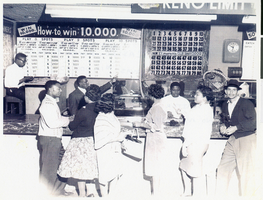Search the Special Collections and Archives Portal
Search Results
"The Knave of Diamonds" by Henry Steele, 1931
Level of Description
Archival Collection
Collection Name: UNLV Libraries Collection of Gambling Related Sheet Music
Box/Folder: Oversized Box 02
Archival Component
"The Road to Ruin" by Geo. Le Brunn, 1890
Level of Description
Archival Collection
Collection Name: UNLV Libraries Collection of Gambling Related Sheet Music
Box/Folder: Oversized Box 02
Archival Component
"Since Ma is Playing Mah Jong" by Billy Rose and Con Conrad, 1924
Level of Description
Archival Collection
Collection Name: UNLV Libraries Collection of Gambling Related Sheet Music
Box/Folder: Oversized Box 02
Archival Component
"The Summer Widowers" by A. Baldwin Sloane, 1910
Level of Description
Archival Collection
Collection Name: UNLV Libraries Collection of Gambling Related Sheet Music
Box/Folder: Oversized Box 02
Archival Component

Transcript of interview with James M. Lancaster by Linda Voorvart, March 4, 1980
Date
Archival Collection
Description
On March 4, 1980, Linda Voorvart interviewed former senior safety engineer and power plant operator, James M. Lancaster (born July 5th, 1911 in Trinidad, Colorado) in his home in Las Vegas, Nevada. Lancaster explains how he first came to Southern Nevada from Mexico and Cuba. Lancaster then goes on to explain his occupational history, and the different jobs that he held in Southern Nevada, specifically at the Nevada Test Site.
Text

Photograph of the El Morocco Club's Keno board, 1961
Date
Archival Collection
Description
El Morocco Casino's Keno Board. Limit was $10,000. Keno checker is Wilbert Harris; Keno writer Willie Gomez; Casino manager Q. B. Bush (pointing). Annotation: "1961, El Morocco Casino keno board when the limit was $10,000.00, keno checker Wilbert Harris, keno writer Willie Gomez, casino manager Q. B. Bush".
Image

Transcript of interview with Helen Cecil by Susan Vogel, March 16, 1978
Date
Archival Collection
Description
On March 16, 1978, Susan Vogel interviewed Helen Cecil (born November 4, 1916 in Silver City, Utah) in her home in Las Vegas, Nevada. She relocated to Las Vegas with her parents for health reasons. This interview covers family life, education, employment and the growth and development of Las Vegas. Helen attended Las Vegas High School and then went on to work at the Las Vegas High School for many years, an accomplishment that she is extremely proud of. During the interview she also mentions the Boulder Dam, the Old Ranch, and the Westside.
Text

Transcript of interview with Mary Cooke by Gigi Arino, March 18, 1978
Date
Archival Collection
Description
On March 18, 1978, Gigi Arino interviewed antique shop owner, Mary B. Cooke (born November 13th, 1936 in Watertown, Wisconsin) in her antique shop in Las Vegas, Nevada. During this interview Mary discusses previous jobs, personal family history, education, and the growth and development of the city. She also expresses her opinions on the topic of welfare, healthcare and the condition of the hospitals in Las Vegas.
Text

Transcript of interview with Jack Cornell by Richard Fesler, February 18, 1979
Date
Archival Collection
Description
On February 18, 1979, Richard Fesler interviewed Jack W. Cornell (born 1918 in Manhattan, Nevada) about his experiences living in Nevada. The two first discuss historical buildings, including the Nye County Courthouse, and Cornell describes his family background and the different locations at which his ancestors lived. Cornell then talks about his experiences as an airplane mechanic for the Army Air Corps during World War II and the different countries he would visit during that time. The two also discuss the effects of the Depression, Cornell’s work in automotive body repair, and his recreational activities. Cornell also describes an experience in which he assisted an air escort for President Roosevelt, and he also describes when he witnessed one of the atomic tests. The interview concludes with Cornell’s thoughts on how the rural area in Manhattan has changed over time.
Text

Transcript of interview with Dorothy George by Claytee White, October 13, 2003
Date
Archival Collection
Description
After serving as a nurse in World War II in Hawaii, Okinawa and Japan, Dorothy returned home to Chippewa Falls, Wisconsin. She experienced a particularly bad winter and she set out for California but stopped in Las Vegas to visit the family of her traveling companion, a girlfriend from her home town. The girlfriend returned to Wisconsin and George applied for a nursing license and got it within three days. She never left. Dorothy met her husband while working the night shift at Clark County Hospital. He would come in regularly to assist his patients in the births of their babies. Their occupations and their service in World War II drew them together in a marriage that has lasted over fifty years. From 1949 to this interview in 2003, Dorothy George has seen Las Vegas grow from a town that she loved to a metropolitan area that is no longer as friendly. She reminisces about the Heldorado parades, family picnics at Mount Charleston, watching the cloud formed by the atomic bomb tests, raising six successful children, leading a Girl Scout Troop, and working in organizations to improve the social and civic life of Las Vegas.
Text
